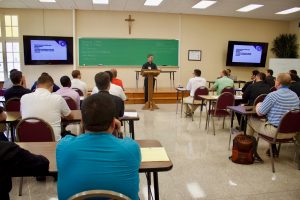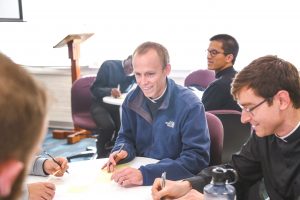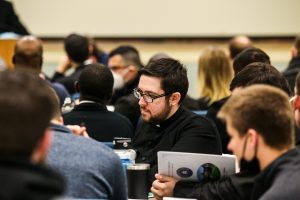From the Notre Dame Seminary Formation Handbook
363. One of the overall goals of a seminary formation program is to prepare a seminarian who is widely knowledgeable in humanity and the human condition, deeply engaged in a process of understanding Divine Revelation, and fully committed and adequately skilled to communicate his knowledge to as many people as possible.
364. “If we expect every Christian to be prepared to make a defense of the faith and to account for the hope that is in us, then all the more should candidates for the priesthood and priests have diligent care of the quality of their intellectual formation in their education and pastoral activity. For the salvation of their brothers and sisters they should seek an ever deeper knowledge of the divine mysteries” (PDV 51).
365. Notre Dame Seminary has integrated the requirements of intellectual formation into the priestly formation program as stipulated by Pastores Dabo Vobis (51-56) and the Program of Priestly Formation (PPF 136-140, 146-190).
Purpose
366. The purpose of intellectual formation is for the seminarian to grasp the Catholic intellectual and liturgical tradition, to be able to proclaim and teach the Gospel of Christ, to communicate effectively the mystery of God to people of today, and to be equipped for the continuing pursuit of truth.
367. The commitment to study, which takes up no small part of the time of those preparing for the priesthood, is not in fact an external and secondary dimension of their human, Christian, spiritual, and vocational growth. In reality, through study, especially the study of philosophy and theology, the future priest assents to the Word of God, grows in his spiritual life, and prepares himself to fulfill his pastoral ministry (PDV 51).
Criteria
368. “Intellectual formation in the seminary program centers on theology as a search for ‘an ever deeper knowledge of the divine mysteries’ (PDV 51). This kind of theological study which far exceeds a purely technical approach to ‘religious phenomena’ unfolds” in a particular, deliberate way (PPF 163).
369. Notre Dame Seminary seeks to present the study of theology in a style characterized by the pastoral mission of the Church and the seminarian’s cultivation of the spiritual life that draws him into the heart of the Church.
370. In following the Program of Priestly Formation (cf. 163), the following criteria is observed:
- Theology is truly to be fides quarens intellectum. This direction is not the same as the approach of religious studies or the history of religions. The seminary study of theology begins in faith and ends in faith, as should all theological inquiry and study.
- In the seminary, the study of theology is oriented to one’s own faith and also to the faith of others. The study of theology is apostolically motivated.
- The study of theology enriches and expands the personal faith of the seminarian studying it.
- When theology is studied in the context of priestly formation, it cannot be detached other human knowledge. In fact, it is to be integrated with other elements of human understanding, especially philosophy and the human sciences.
Goals
- The seminary study of theology, because it begins in faith and ends in faith, must flow from prayer and lead to prayer.
- The theology studied in preparation for priestly ministry must find integration and focus in the sacred liturgy.
- Because theology studied in light of priestly ministry must be directed to a practical wisdom, it must offer a complete and unified vision of the truths of faith.
371. The priestly formation program at Notre Dame Seminary seeks to prepare seminarians for ordained ministry and ongoing formation after ordination. Seminarians completing their formation at Notre Dame Seminary ought to be men who:
- Evidence an ability to learn and value knowledge for its own sake and for the sake of ministry;
- Possess the readiness and capacity to become learned individuals;
- Participate in class and coursework to their full potential and havethe ability to meet the minimum standards for all courses;
- Appreciate intellectual pursuits marked by motivation, application, thoroughness, consistency, and soundness of judgment;
- Have the ability to engage in intelligent discussion, discern issues, grasp details, and master concepts;
- Possess the capacity to think and use ideas and concepts in the disciplines of liberal studies;
- Can integrate knowledge both conceptually and practically;
- Have the ability to reflect critically on their own experience andmake reasoned, prudential judgments.372. The Rector-President provides oversight of the intellectual formation program to support the faculty with resources and to assure that seminarians are receiving the best education possible. He reports particular concerns and needs to the Rector-President and Academic Dean.
373. The Formation Advisor works closely with each seminarian in course selection and other matters related to the academics. He assists the seminarians in
Instruments
making decisions about degrees, adding/dropping classes, and developing a plan to complete all the course work in the duration of a seminarian’s stay at the seminary.
374. The Academic Dean/Director of Intellectual Formation assists the seminarian in selecting courses that meet the obligations of the particular degree although the seminarian is ultimately responsible for tracking which courses are needed for the degree,
375. The Formation Advisor and Spiritual Director can also be resources for a seminarian who may need to discuss his challenges in completing academic assignments, understanding the Church’s position or teaching in areas being discussed during classes, addressing matters related to time management, and the forming of study habits.
376. The Academic Dean can assist seminarians in making decisions about fulfilling degree requirements and electives. The Academic Dean can also direct the seminarian to various offices that provide academic assistance. The Academic Dean can also discuss with professors, with the seminarian’s permission, any difficulties the seminarian may have that are causing him not to meet certain expectations of a course.
377. Study Hours/Library: Seminarians are encouraged to make good use of their time for study and research. When classes are not in session, particularly during the evening hours, seminarians generally are expected to be involved with their academic formation notwithstanding other areas of formation. The seminary facility includes a library, computer room, spiritual reading rooms, and several common areas for study, reading, and research.



